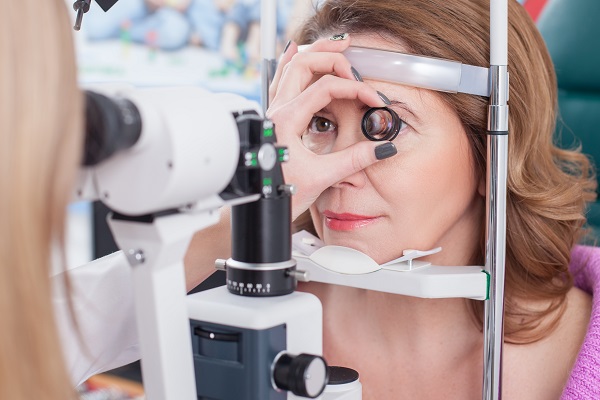What do our eyes have to do with overall health? Actually, tons!
Many people do not realize an eye exam is not just determining your prescription for glasses, but it’s a wellness check of your overall health. During that awkward silence, when the eye doctor is invading your personal space with his bright light, he is actually examining structures of the eye that can show changes related to systemic health conditions and diseases. In some cases, an eye exam can save your life!

Conditions An Eye Exam Can Detect
There are many serious health conditions that are often first detected during an eye exam. Here are a few things that your eye doctor might find:
High blood pressure
The blood vessels in the back of the eye are often a predictor of how the rest of the blood vessels in the body are doing. Narrowing of the ocular arteries can often signal high blood pressure and can give the doctor insight about a future heart disease.
Some studies show that high blood pressure can increase the pressure inside the eyeball. This increased eye pressure can lead to glaucoma, causing loss of peripheral vision if left untreated.
High cholesterol
During an eye exam, your doctor will examine the cornea, the clear front surface of the eye, for a hazy white or grey ring called arcus. Any patient under the age of 60 with evidence of arcus should have a yearly cholesterol blood test with their primary care physician.
Cholesterol deposits can also make their way to the retinal vessels and cause a blockage, which can lead to vision loss. Cholesterol in the eye can even be an early detector for someone at risk for a life-threatening stroke!
Diabetes
Did you know one of the first clues to a diabetes type 2 diagnosis is fluctuating vision and small bleeds within the vessels of your eye? A Hemoglobin A1c blood test can be ordered to confirm the increased sugar levels.
If the eye doctor sees these changes early, he can recommend exercise and diet changes to prevent the condition from worsening.
Autoimmune diseases
Many autoimmune diseases also cause eye problems. Rheumatoid arthritis can cause red eyes. Sjogren syndrome can cause dry eyes. Multiple Sclerosis can cause missing parts of vision. Graves’ disease can cause double vision. Ankylosing spondylitis can cause light sensitivity and recurring inflammation, called uveitis. In fact, many times the eye problem will occur first, which will lead to an autoimmune diagnosis.
Schedule an Eye Exam Today
Your eye exam is so much more than just telling you if you need glasses or not. It truly gives a view into your body and your overall health through your eyes! Get your eye exam, not only for your vision, but to check on the overall health of your body.
When was your last eye exam? Contact Berkeley Eye Center today to schedule a comprehensive exam. We have locations all over Houston and in surrounding communities!
